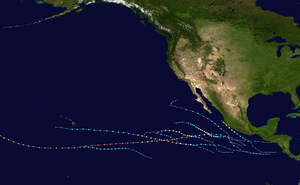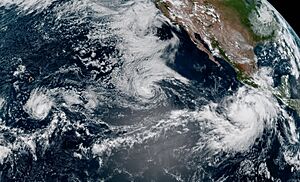2023 Pacific hurricane season facts for kids
The 2023 Pacific hurricane season is the time of year when most tropical storms and hurricanes form in the Pacific Ocean. This season officially started on May 15 for the eastern Pacific and June 1 for the central Pacific. It will end on November 30. These dates are chosen because most storms usually happen during this period.
This season started later than usual. The first storm, Hurricane Adrian, didn't form until June 27. This made it the second-latest first named storm in the eastern Pacific since 1971.
Hurricane Calvin was the first major hurricane of the season. It formed near Mexico and passed south of Hawaii, bringing a lot of rain. The strongest storms so far have been Category 4 hurricanes Dora and Fernanda. Dora also went near Hawaii but stayed further south. The strong winds from Dora, combined with a high-pressure area, made several wildfires in Hawaii much worse. Dora also became the first storm since 2018 to cross the International Date Line into the Western Pacific. It was only the second storm ever to stay a hurricane across all three Pacific areas (eastern, central, and western), like Hurricane John did in 1994.
Predicting the Storms
| Record | Named storms |
Hurricanes | Major hurricanes |
Ref | |
|---|---|---|---|---|---|
| Average (1991–2020): | 15 | 8 | 4 | ||
| Record high activity: | 1992: 27 | 2015: 16 | 2015: 11 | ||
| Record low activity: | 2010: 8 | 2010: 3 | 2003: 0 | ||
| Date | Source | Named storms |
Hurricanes | Major hurricanes |
Ref |
| May 4, 2023 | SMN | 16–22 | 7–11 | 3–5 | |
| May 25, 2023 | NOAA | 14–20 | 7–11 | 4–8 | |
| Area | Named storms |
Hurricanes | Major hurricanes |
Ref | |
| Actual activity: | EPAC | 8 | 6 | 4 | |
| Actual activity: | CPAC | 0 | 0 | 0 | |
| Actual combined activity: | 8 | 6 | 4 | ||
Before each Pacific hurricane season, experts try to guess how many storms will form. The United States National Oceanic and Atmospheric Administration (NOAA) and Mexico's Servicio Meteorológico Nacional (SMN) make these predictions. They look at things like ocean temperatures to help them guess.
On average, between 1991 and 2020, an eastern Pacific hurricane season had about 15 tropical storms, 8 hurricanes, and 4 major hurricanes.
On May 4, 2023, SMN predicted 16 to 22 named storms, with 7 to 11 becoming hurricanes and 3 to 5 becoming major hurricanes. They thought warmer ocean temperatures and the chance of an El Niño would increase storm activity. On May 25, 2023, NOAA also predicted an active season. They expected 14 to 20 named storms, 7 to 11 hurricanes, and 4 to 8 major hurricanes.
How the Season Unfolded

The first few weeks of the Eastern Pacific hurricane season were quiet. Hurricane Adrian was the first storm, forming on June 27. Usually, the first named storm appears around June 10. Two days later, Hurricane Beatriz formed near the Mexican coast.
Next, Hurricane Calvin formed in mid-July off Mexico. It became the first major hurricane of the season as it moved towards Hawaii. Hurricane Dora started August by quickly becoming a Category 4 hurricane, also heading towards Hawaii. On August 11, Dora crossed the International Date Line. This made it only the second storm ever to stay hurricane-strength across the Eastern, Central, and Western Pacific. Dora also kept its Category 4 strength longer than any other Pacific hurricane on record.
Another storm in early August was Tropical Storm Eugene, which stayed far from Mexico. After that came Category 4 Hurricane Fernanda and Tropical Storm Greg. Neither of these storms went near land. Then came Tropical Storm Hilary.
Storm Details and Effects
This table shows all the storms that have formed in the 2023 Pacific hurricane season. It includes how long they lasted, their names, where they made landfall (hit land), any damage they caused, and how many people died. Deaths in parentheses are indirect, meaning they were related to the storm but not directly caused by it (like a car accident during a storm). All damage costs are in 2023 US dollars.
| Saffir–Simpson Hurricane Scale | ||||||
| TD | TS | C1 | C2 | C3 | C4 | C5 |
| Storm name |
Dates active | Storm category
at peak intensity |
Max 1-min wind mph (km/h) |
Min. press. (mbar) |
Areas affected | Damage (USD) |
Deaths | Refs
|
||
|---|---|---|---|---|---|---|---|---|---|---|
| Adrian | June 27 – July 2 | Category 2 hurricane | 105 (165) | 970 | Revillagigedo Islands | None | None | |||
| Beatriz | June 29 – July 1 | Category 1 hurricane | 85 (140) | 992 | Western Mexico | Minimal | 0 (1) | |||
| Calvin | July 11–19 | Category 3 hurricane | 125 (205) | 955 | Hawaii | Minimal | None | |||
| Four-E | July 21–22 | Tropical depression | 35 (55) | 1006 | None | None | None | |||
| Dora | July 31 – August 11 | Category 4 hurricane | 145 (230) | 942 | Hawaii, Johnston Atoll | None | None | |||
| Eugene | August 5–7 | Tropical storm | 70 (110) | 992 | Southern Baja California peninsula | None | None | |||
| Fernanda | August 12–17 | Category 4 hurricane | 130 (215) | 955 | None | None | None | |||
| Greg | August 14–18 | Tropical storm | 50 (85) | 1000 | None | None | None | |||
| Hilary | August 16–Present | Category 4 hurricane | 145 (230) | 942 | Western Mexico, Socorro Island | None | None | |||
| Season Aggregates | ||||||||||
| 9 systems | June 27 – Season ongoing | 145 (230) | 942 | Minimal | 0 (1) | |||||
See also
 In Spanish: Temporada de huracanes en el Pacífico de 2023 para niños
In Spanish: Temporada de huracanes en el Pacífico de 2023 para niños
- Weather of 2023
- Tropical cyclones in 2023
- 2023 Atlantic hurricane season
- 2023 Pacific typhoon season
- 2023 North Indian Ocean cyclone season
- South-West Indian Ocean cyclone seasons: 2022–23, 2023–24
- Australian region cyclone seasons: 2022–23, 2023–24
- South Pacific cyclone seasons: 2022–23, 2023–24
 | Roy Wilkins |
 | John Lewis |
 | Linda Carol Brown |



